Honda HR-V vs SEAT Leon SP Sportstourer – Which car suits you better?
Two cars, one duel: Honda HR-V meets SEAT Leon SP Sportstourer.
Which one wins in performance, efficiency and value for money? Find out now!
Here’s where it gets real: The technical differences in detail
Costs and Efficiency: Price and efficiency are key factors when choosing a car – and this is often where the real differences emerge.
SEAT Leon SP Sportstourer has a to a small extent advantage in terms of price – it starts at 25800 £, while the Honda HR-V costs 29700 £. That’s a price difference of around 3908 £.
Fuel consumption also shows a difference: the SEAT Leon SP Sportstourer manages with 0.30 L and is therefore convincingly more efficient than the Honda HR-V with 5.40 L. The difference is about 5.10 L per 100 km.
Engine and Performance: Power, torque and acceleration are the classic benchmarks for car enthusiasts – and here, some clear differences start to show.
When it comes to engine power, the SEAT Leon SP Sportstourer has a decisively edge – offering 272 HP compared to 131 HP. That’s roughly 141 HP more horsepower.
In acceleration from 0 to 100 km/h, the SEAT Leon SP Sportstourer is noticeable quicker – completing the sprint in 7.90 s, while the Honda HR-V takes 10.60 s. That’s about 2.70 s faster.
In terms of top speed, the SEAT Leon SP Sportstourer performs noticeable better – reaching 220 km/h, while the Honda HR-V tops out at 170 km/h. The difference is around 50 km/h.
There’s also a difference in torque: the SEAT Leon SP Sportstourer pulls evident stronger with 360 Nm compared to 253 Nm. That’s about 107 Nm difference.
Space and Everyday Use: Cabin size, boot volume and payload all play a role in everyday practicality. Here, comfort and flexibility make the difference.
Both vehicles offer seating for 5 people.
In curb weight, the SEAT Leon SP Sportstourer is barely noticeable lighter – 1384 kg compared to 1452 kg. The difference is around 68 kg.
In terms of boot space, the SEAT Leon SP Sportstourer offers decisively more room – 620 L compared to 319 L. That’s a difference of about 301 L.
In maximum load capacity, the SEAT Leon SP Sportstourer performs a bit better – up to 1600 L, which is about 311 L more than the Honda HR-V.
When it comes to payload, SEAT Leon SP Sportstourer evident takes the win – 569 kg compared to 418 kg. That’s a difference of about 151 kg.
All in all, the SEAT Leon SP Sportstourer shows itself to be is largely superior and secures the title of DriveDuel Champion.
It impresses with the more balanced overall package and proves to be the more versatile companion for everyday use.
Honda HR-V
The Honda HR-V impresses with its sleek design, combining a dynamic exterior with a comfortable and spacious interior. This versatile compact SUV offers a smooth and responsive driving experience, making it ideal for both city commuting and weekend adventures. Equipped with advanced safety features and technology, the HR-V ensures a connected and secure journey for all passengers.
details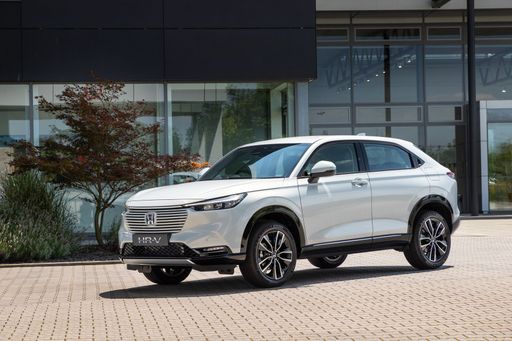 @ hondanews.eu
@ hondanews.eu
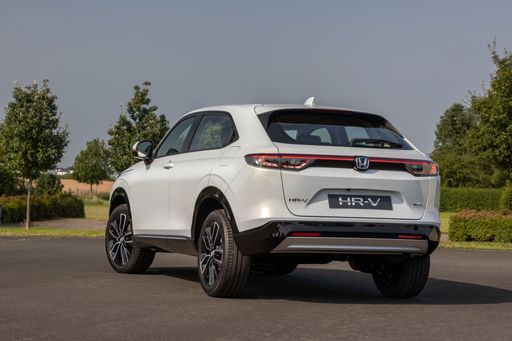 @ hondanews.eu
@ hondanews.eu
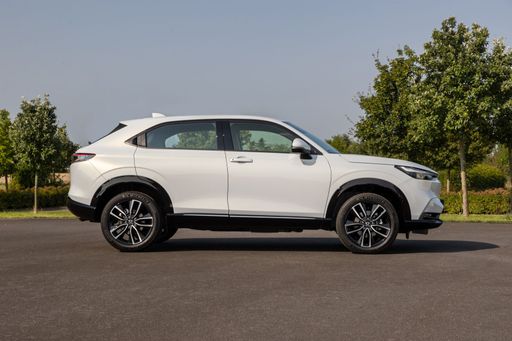 @ hondanews.eu
@ hondanews.eu
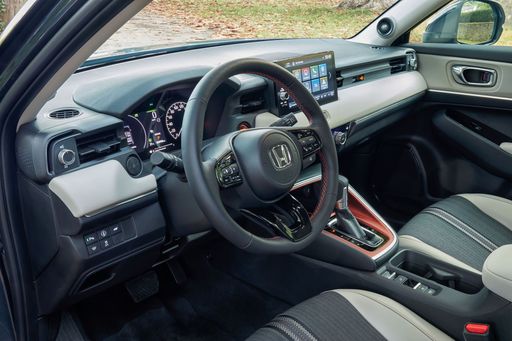 @ hondanews.eu
@ hondanews.eu
SEAT Leon SP Sportstourer
The SEAT Leon SP Sportstourer exudes a sleek and dynamic design, merging practicality with style effortlessly. Inside, the spacious and versatile interior ensures a comfortable ride for both driver and passengers, offering ample space for luggage and family needs. With its advanced technology and efficient performance, the Leon SP Kombi stands out as a superb choice for those seeking a reliable and modern family estate.
details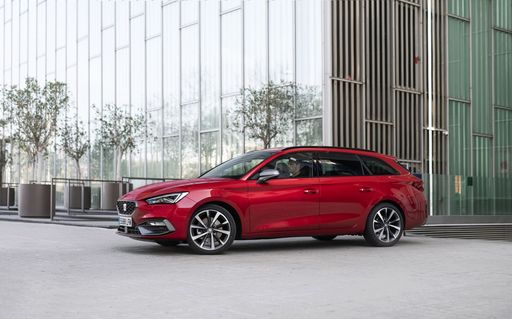 @ Seat
@ Seat
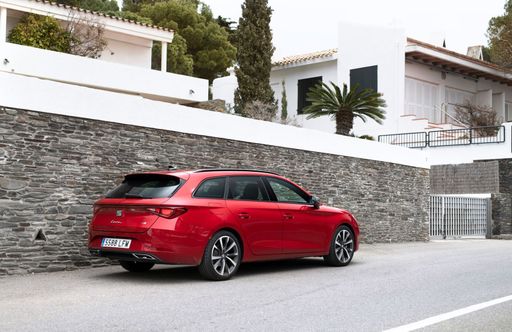 @ Seat
@ Seat
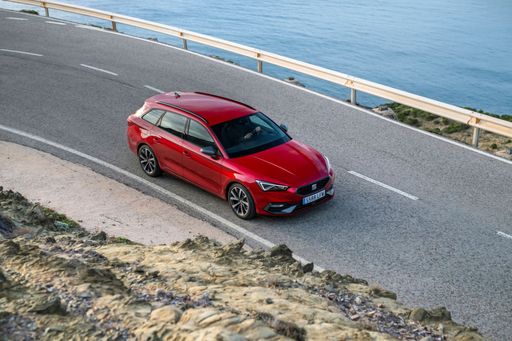 @ Seat
@ Seat
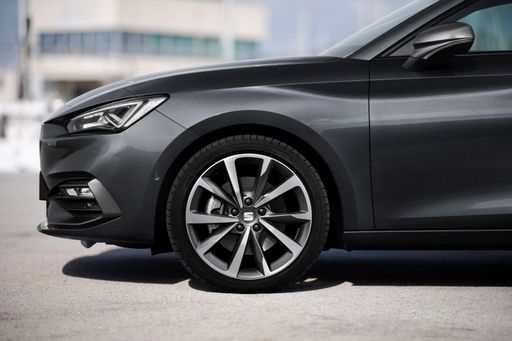 @ Seat
@ Seat
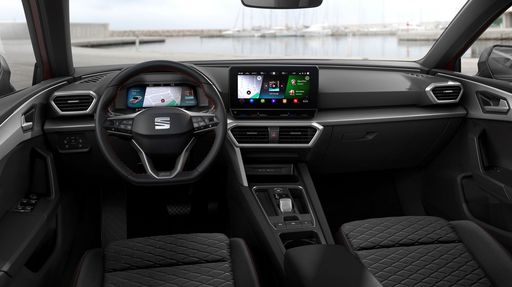 @ Seat
@ Seat

|

|
|
|
|
Costs and Consumption |
|
|---|---|
|
Price
29700 - 35400 £
|
Price
25800 - 37900 £
|
|
Consumption L/100km
5.40 L
|
Consumption L/100km
0.3 - 5.7 L
|
|
Consumption kWh/100km
-
|
Consumption kWh/100km
-
|
|
Electric Range
-
|
Electric Range
131 - 132 km
|
|
Battery Capacity
-
|
Battery Capacity
19.70 kWh
|
|
co2
122 g/km
|
co2
7 - 130 g/km
|
|
Fuel tank capacity
40 L
|
Fuel tank capacity
40 - 45 L
|
Dimensions and Body |
|
|---|---|
|
Body Type
SUV
|
Body Type
Estate
|
|
Seats
5
|
Seats
5
|
|
Doors
5
|
Doors
5
|
|
Curb weight
1452 kg
|
Curb weight
1384 - 1716 kg
|
|
Trunk capacity
319 L
|
Trunk capacity
470 - 620 L
|
|
Length
4355 mm
|
Length
4642 mm
|
|
Width
-
|
Width
1799 mm
|
|
Height
1582 mm
|
Height
1437 - 1456 mm
|
|
Max trunk capacity
1289 L
|
Max trunk capacity
1450 - 1600 L
|
|
Payload
418 kg
|
Payload
414 - 569 kg
|
Engine and Performance |
|
|---|---|
|
Engine Type
Full Hybrid
|
Engine Type
Petrol, Petrol MHEV, Diesel, Plugin Hybrid
|
|
Transmission
Automatic
|
Transmission
Manuel, Automatic
|
|
Transmission Detail
CVT
|
Transmission Detail
Manual Gearbox, Dual-Clutch Automatic
|
|
Drive Type
Front-Wheel Drive
|
Drive Type
Front-Wheel Drive
|
|
Power HP
131 HP
|
Power HP
110 - 272 HP
|
|
Acceleration 0-100km/h
10.6 - 10.8 s
|
Acceleration 0-100km/h
7.9 - 10.8 s
|
|
Max Speed
170 km/h
|
Max Speed
197 - 220 km/h
|
|
Torque
253 Nm
|
Torque
220 - 360 Nm
|
|
Number of Cylinders
4
|
Number of Cylinders
3 - 4
|
|
Power kW
96 kW
|
Power kW
85 - 200 kW
|
|
Engine capacity
1498 cm3
|
Engine capacity
1498 - 1968 cm3
|
General |
|
|---|---|
|
Model Year
2025
|
Model Year
2024 - 2025
|
|
CO2 Efficiency Class
D
|
CO2 Efficiency Class
D, B
|
|
Brand
Honda
|
Brand
SEAT
|
What drive types are available for the Honda HR-V?
The Honda HR-V is available as Front-Wheel Drive.
The prices and data displayed are estimates based on German list prices and may vary by country. This information is not legally binding.
